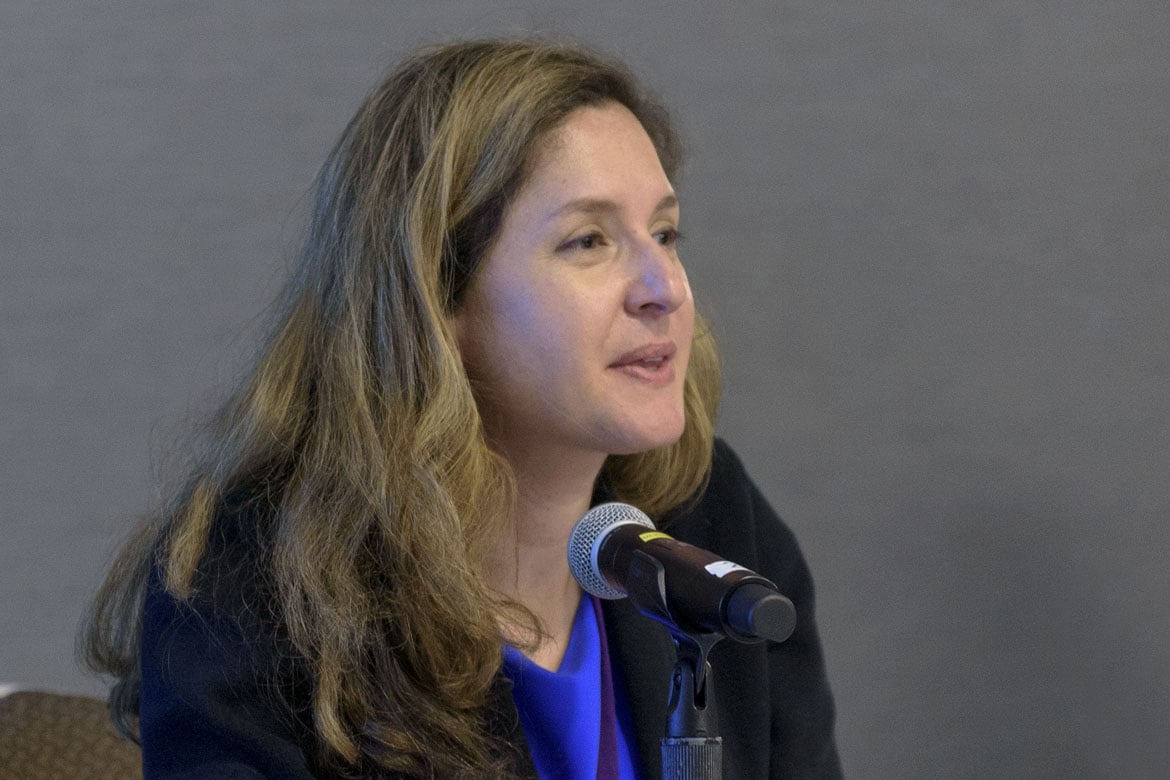Being a physician is hard, but finding purpose after closing a practice can be even harder. That is why gradually transitioning toward retirement is an effective way for doctors to find purpose and enjoyment in the next chapter of their lives.
A successful transition requires both financial and mental preparation, said Michelle Pannor Silver, PhD, an associate professor with the University of Toronto’s sociology department and Interdisciplinary Centre for Health & Society. She is pictured above.
“I think of retirement as an art form—perception is in the eye of a beholder,” Silver recently said during an education session for senior physicians. “For some of you, retirement is associated with freedom, leisure and happiness. Others will associate it with boredom and death.”
“From the moment you enter medical school, you are groomed through institutional effort to view your professional role as paramount,” Silver said. “In many ways, as a physician, you are conditioned to embrace a career trajectory that emphasizes work over all other aspects of life.”
As a consequence of this conditioning, she said, retirement can seem disorienting and even selfish.
Silver recalled interviewing a retired cardiologist who was given a warm sendoff by his colleagues, during which they went over in fine detail his long list of accomplishments.
“He told me his retirement party felt more like a funeral,” she said to laughs of recognition during the education session, which was hosted by the AMA Senior Physicians Section during the 2019 AMA Annual Meeting in Chicago. “He wasn’t done yet.”
Similarly, Silver told of a physician who raised four children while running a successful family medicine practice and initially struggled with retirement until she learned to “recalibrate her life.”
“She always loved medicine, but it demanded everything of her until there was nothing left to take,” Silver said.
Then, as this physician endeavored to find focus, she enrolled in a pottery class, then an art history course, and soon a full course load. In doing this, she had applied what she enjoyed most about medicine to her retirement: “She had reconnected with her core love of learning.”
Here are some other aspects of a successful transition strategy.
Financial planning must start early and often. Silver told of physicians who had to take donations from their patients so they could retire. “I’ve heard a lot of stories and retirement is much better when it is a choice,” she said.
Declutter. Apply the skills you’ve developed to focus on what brings you joy. Choose activities to maximize positive emotional experience.
Practice. “Practice is a particularly meaningful word in medicine—it’s your work,” Silver said, advising senior physicians to remember that practicing in order to get good at something is not just for early stages of the life course. She suggested rechanneling the energy that went toward the singular goal of being a physician into practicing something new.
Stay active. Stay engaged by taking classes or taking trips that require some planning, or by focusing on aspects of your career you found rewarding, such as writing or teaching.
On the flipside, employers and organizations need to show creativity and flexibility to assist physicians in transition and to take advantage of the contributions they can provide. With 30% of the physician workforce older than 60, organizations are facing a “massive brain drain and loss of institutional memory.”
Employers need more sensitive and creative ways to capture mature workers’ knowledge, Silver said.
Silver cited these options for retaining mature workers “to the extent that the interest in continuing to work is mutual.”
Job sharing. Offering a reduced workload or flexibility to individuals interested in gradually retiring who are supported in efforts to cooperate with employees on vacation or parental leave.
Flexible roles. These full- or part-time jobs recognize the value of mature workers and emphasize workers’ emotional and mental health.
Create job boards. Share information about mature worker job opportunities.
Later-career mentorship programs. Mentorship is not only relevant to younger workers and can be very helpful to those in transition.
Medical institutions ought to invest time and resources into facilitating late-career planning “that honors the physicians’ life-long commitment to medicine,” Silver said.
“Ageism still pervades much of the workforce,” she added. “I believe that we are missing out on a subset of society who want to keep contributing, but are being governed by anachronistic norms and ageist assumptions.”
Doctors who don’t already have a financial planner can contact AMA Insurance and inquire about their Physicians Financial Partners program. This program provides physicians access to vetted financial professionals across the country.




